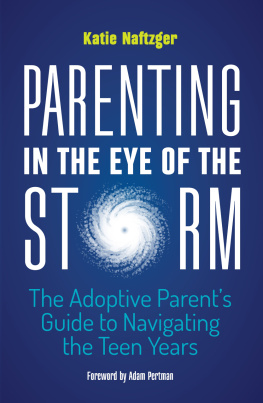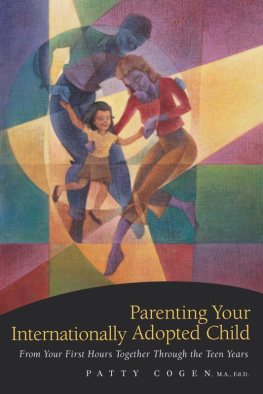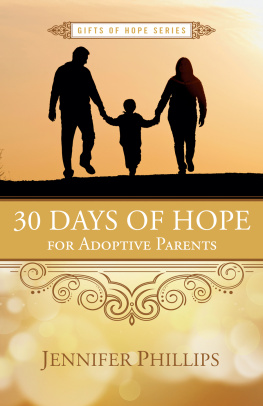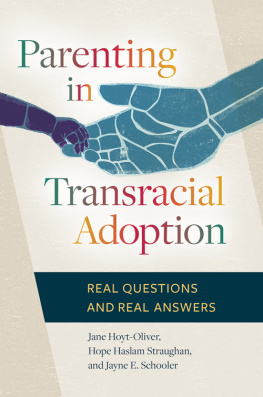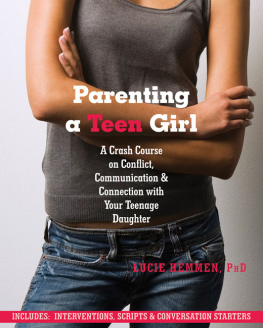

The Adoptive Parents
Guide to Navigating
the Teen Years
Katie Naftzger
Foreword by Adam Pertman

Jessica Kingsley Publishers
London and Philadelphia
Contents
Foreword
A few years ago, I was talking on the phone with a colleague about some work we were planning to do together. Toward the end of the call, when the subject turned to our families, she asked how old my two children were. Theyre both teenagers, I said. Without skipping a beat, she replied, Oh, Im sorry.
Yes, it was a joke and we both laughed. It obviously was funny, however, largely because it was rooted in reality; that is, for a broad array of reasons related to normative human development, raising an adolescentalmost any adolescentcan be challenging. Add greater, ongoing complexity to the picture, such as divorce or single-parenting or adoption (among many others), and the job invariably gets more complicated, more stressful and more difficult.
Thats why there are therapists, support groups and parenting books, right? Because one thing all moms and dads learn every day is that love alone is not enough to raise a child. We also need experience, knowledge and resources. Alas, one of the many results of the secrecy and stigma that has enveloped adoption for generations is that adoptive parents too often do not receive the knowledge and tools that would benefit them and, consequently, their sons and daughters.
All of which is why this book, Parenting in the Eye of the Storm: The Adoptive Parents Guide to Navigating the Teen Years , is so important. Every stage of adopted childrens lives is obviously significant, and understanding the sometimes-challenging issues of every stage enables parents to provide better nurture and guidance. But there is a dearth of well-researched, thoughtfully presented books on the specific subject of parenting children and youth during the period of their lives that is already so complicated, so fraught with issues relating to identity, independence and family connections.
In Parenting in the Eye of the Storm , Katie Naftzger takes adoptive parents through the teen years with a wisdom born of her extensive research, her years as a therapist for adopted teens and their families, and her own lived experience as a person who was adopted (from Korea). Its a powerful combination, and the result is that she is able to provide insights and suggestions that are not only well-informed, but also are very useful in a practical, day-to-day way.
At the same time, the author recognizes that adoptive parents dont just need information and insights. They also need answers, guidance and understandingand a roadmap for fitting all the pieces together. The most valuable thing about this book is that it provides that roadmap.
For example, in her first chapter, Layers of Loss for Adoptees, Katie delves into the emotional experiences of adopted teens with common losses such as of safety, as well as less-examined ones such as loss of accountability and of innocence. Then she takes the reader through four parenting tasks: un-rescuing, setting adoption-sensitive limits, having connecting conversations and envisioning their adopted teens future, in that order. From there, she delves into the vital topics of race and mental health, and concludes by discussing why self-care is so important for adoptive parents, not just for their wellbeing but also to model for their teens.
At the bottom line, this must-read book for adoptive parents is an invaluable addition to a toolbox that, until now, had too many missing pieces. My only complaint about Parenting in the Eye of the Storm is this: Why wasnt it around when my wife and I needed it? No joke.
Adam Pertman
President, CEO and Founder of the National Center on
Adoption and Permanency
Introduction
Jennifer was an adoptive parent who contacted me requesting a parent consultation regarding her 15-year-old daughter adopted from China, Maddie.
As I mentioned on the phone, I saw you speak at an adoption conference four or five years ago. I think you were talking about the adoption groups you were doing at the time. Anyway, for me, the fact that youre an adoptee is huge. I mean, Im her mom and I love her but Im not adopted and dont know what that feels like.
Jennifers voice quivered just slightly and she looked away.
A few weeks ago Maddie told me that shes been unhappy. She said that shes lonely. And shes been crying a lot, almost every day. I told her that we could go to China and maybe even search for her birth parents but that didnt seem to help. She just told me that I dont get it and that Ill never understand what shes going through. But then she said something about how maybe life wasnt worth it. It scared me. Thats when I dug out your card and called you.
Has she ever been like this before?
No, not at all. I dont know what happened. Maddie was wonderful. She was so happy, never cried. Her teachers adored her.
I asked:
So, she didnt get angry much when she was a kid?
No.
Jennifer thought for a second.
Oh, she got mad at me a few times when she was younger. Twice, she said, I hate you. Youre not my real mom anyway. But later on she apologized. I think she felt really bad about it.
Jennifer rubbed her forehead as she teared up.
It just breaks my heart out to see her like this.
Sitting across from me, Jennifer flopped back on the couch.
Jennifer went on to explain that she previously talked with her individual therapist about her difficulties with Maddie. Her therapist believed that Maddie was testing Jennifers resolve as a parent and suggested that Jennifer keep reassuring Maddie that she loves her, and will never abandon her. Her therapist also suggested that Jennifer write her a letter reiterating that message.
But when Jennifer did that it seemed to make things worse.
She got really angry with me when I gave her the letter, almost like I had somehow hurt her even more. I have no idea why. Now, she barely acknowledges me. I dont know what to think, whether this is an adoption thing, or whats going on.
Jennifer sighed again, frustrated.
Many therapists working with adoptive parents would have probably recommended a variation of that of Jennifers therapistIll be there for you, I love you and Ill never abandon you. She was right in that it may well have been a test, but a different one. Maddies internal question was not Will you leave me? but Can you tolerate my emotional anguish which is a part of me?
But adopted teens dont want or need reassurance. They want to feel less alone and more understood. That requires an entirely different messageI understand what youre saying, its not easy, these things take time, maybe even a lifetime. Its really hard.
MY BACKGROUND
My adoption experience is broad and deep. I am Korean-born, internationally and transracially adopted. My life experience informs my work, and my work informs my life. My interest in helping others began long before I became a therapist. Although I cant confirm this, doing this kind of work with individuals and families was in my blood, as the saying goes.
My adoptive parents were loving, kind and compassionate. But they didnt know what my younger sister, also Korean and adopted, and I needed, especially during the teen years. My parents learned the hard way that love is not enough. They would be the first to tell you that, if they could go back, they would have parented us differently.
Next page
